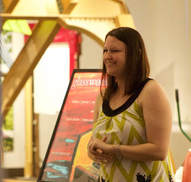“Publishing and Writing for the Public”
Changes to the Previously Named
"New Media Writing and Publishing" Concentration
and CUGS
"New Media Writing and Publishing" Concentration
and CUGS

by Matthew Vesely
Previously known as the concentration in “New Media Writing and Publishing,” The Writing Arts Department at Rowan University is excited to launch its revamped concentration in “Publishing and Writing for the Public” beginning in the Spring 2019 semester.
The publishing industry is a multi-faceted field that can sometimes feel too complicated for young writers to grasp. Working with writing that is not your own can seem daunting, because now your responsibilities become more than writing and pushing your work onto others. The publishing industry includes careers in editing, marketing, communications, and subsidiary rights.
Writing for the public then means taking your writing out to a public platform. Professor Jason Luther (who is currently proposing a course in Self-Publishing) is one of the many Writing Arts professors with a voice in creating this concentration. “Rhetorically-speaking, public writing tends to refer to the wider scene of composition and its role in civic engagement — how texts collide with audiences and produce other texts. So we’re not just talking about genres, but the ways in which writing finds (or even produces) audiences through the creation or cultivation of certain publications, spaces, or sites.”
Previously known as the concentration in “New Media Writing and Publishing,” The Writing Arts Department at Rowan University is excited to launch its revamped concentration in “Publishing and Writing for the Public” beginning in the Spring 2019 semester.
The publishing industry is a multi-faceted field that can sometimes feel too complicated for young writers to grasp. Working with writing that is not your own can seem daunting, because now your responsibilities become more than writing and pushing your work onto others. The publishing industry includes careers in editing, marketing, communications, and subsidiary rights.
Writing for the public then means taking your writing out to a public platform. Professor Jason Luther (who is currently proposing a course in Self-Publishing) is one of the many Writing Arts professors with a voice in creating this concentration. “Rhetorically-speaking, public writing tends to refer to the wider scene of composition and its role in civic engagement — how texts collide with audiences and produce other texts. So we’re not just talking about genres, but the ways in which writing finds (or even produces) audiences through the creation or cultivation of certain publications, spaces, or sites.”
This concentration focuses on how your writing can take part in “civic engagement.” Rhetorically, as a writer, we conceive our authorial (intended) audience, but they may seem abstract, like some far off being. Writing for the public means not just considering your audience, but finding (or even creating them) through “certain publications, spaces, or site” - traditional forms of publications in our modern day-in-age.
“All the while, you want it to be interesting! There’s so much on the internet for the public to access and read on a daily basis, we have to find ways to draw our audience in.” – Professor Katie Budris (teaches Editing the Literary Journal/Editor-in-Chief of Glassworks)
“All the while, you want it to be interesting! There’s so much on the internet for the public to access and read on a daily basis, we have to find ways to draw our audience in.” – Professor Katie Budris (teaches Editing the Literary Journal/Editor-in-Chief of Glassworks)
 Rowan Alumni,
Kristina Forest
Rowan Alumni,
Kristina Forest
Alumni of the Writing Arts Department are already succeeding in the publishing field! Kristina Forest, a Rowan Writing Arts alum, currently holds a job at Penguin Random house as the Subsidiary Rights Coordinator. In a recent interview, Forest explained, “employers want to make sure the people they hire have a genuine interest in the material they'll be working with.” Forest has been successful in her career by showing her dedication.
“I applied for various internships with different children's books publishers. After three internships at Macmillan (Subsidiary Rights internship) , Simon & Schuster (Editorial internship) and Abrams (Editorial internship), I got a full time job at Simon & Schuster as a Subsidiary Rights assistant. About ten months later I was offered a promotion to be a Subsidiary Rights Coordinator at Random House. I've been there for a little over a year.”
Having a concentration is one step forward into launching a successful career like Kristina Forest, one Rowan Writing Arts alum taking the world by storm.
Publishing and Writing for the Public classes include:
In addition to…
“I applied for various internships with different children's books publishers. After three internships at Macmillan (Subsidiary Rights internship) , Simon & Schuster (Editorial internship) and Abrams (Editorial internship), I got a full time job at Simon & Schuster as a Subsidiary Rights assistant. About ten months later I was offered a promotion to be a Subsidiary Rights Coordinator at Random House. I've been there for a little over a year.”
Having a concentration is one step forward into launching a successful career like Kristina Forest, one Rowan Writing Arts alum taking the world by storm.
Publishing and Writing for the Public classes include:
- The Publishing Industry
- Self Publishing
- Editing for Publication
- Professions in Publishing
- Rhetorical Theory
- Editing the Literary Journal (Senior Privilege)
- Publishing (Senior Privilege)
In addition to…
- Write for the Workplace
- Photojournalism
- Publication/Layout Design
- Online Journalism
- Media Law
- Intro to New Media
- Fiction to Film
- Particularly Media
- App Media
- Research Practicum
- Internship for Writing Arts
These classes cover the whole range of the publishing industry; traditional and self publishing, old and new media, editorial and design careers. Publishing is a vast field and includes a variety of routes for authors. Prof. Jason Luther teaches a class on the route growing more and more popular: self publishing.
 Jason Luther, Rowan University Professor
Jason Luther, Rowan University Professor
“There is a misconception that DIY or self publishing means writers or composers must do everything alone in order for that work to be authentic. The truth is, communities that I study are constantly teaching each other through workshops at neighborhood print shops, informal meet-ups at libraries or punk shows, or simply by watching YouTube videos made by their peers. The concentration, and my course specifically, provides a number of different pathways to develop a career in public writing, whether that happens through journalism, film, social media management, or self-publishing.”
 Katie Budris, Rowan University Professor
Katie Budris, Rowan University Professor
In another route of publishing, Prof. Katie Budris teaches Editing the Literary Journal (a graduate and senior privilege course).
“Editing the Literary Journal is much like an internship. While students in the class receive a grade for their work, they are also editors of Glassworks magazine, and we function as an editorial team. Under my guidance, and with the collaboration of several faculty editors, student editors get hands-on experience producing a literary magazine, including reading submissions, selecting work for publication, proofreading the finished product, and marketing new issues online and at on-campus events. Students also produce editorial content such as book review, author interviews, and opinion pieces. At the end of the semester, I ask students to prepare a cover letter and resume for an actual entry-level job in publishing. All the work students do in this class applies as real world experience.”
“Editing the Literary Journal is much like an internship. While students in the class receive a grade for their work, they are also editors of Glassworks magazine, and we function as an editorial team. Under my guidance, and with the collaboration of several faculty editors, student editors get hands-on experience producing a literary magazine, including reading submissions, selecting work for publication, proofreading the finished product, and marketing new issues online and at on-campus events. Students also produce editorial content such as book review, author interviews, and opinion pieces. At the end of the semester, I ask students to prepare a cover letter and resume for an actual entry-level job in publishing. All the work students do in this class applies as real world experience.”
For Writing Arts majors, as with all concentrations in the Writing Arts department, acquiring the “Publishing and Writing for the Public” concentration on your degree requires 4 courses (12 credit hours) from qualifying classes.
For non-Writing Arts majors, all Rowan University students are welcome to acquire a CUGS (Certificate in Undergraduate Study) which also requires 4 courses (12 credit hours) from qualifying classes.
In addition to “Publishing and Writing for the Public,” the Rowan Writing Arts Department will also be launching a minor and CUGS in “Technical and Professional Writing.” Minors are an advanced form of the concentration (offered only in “Creative Writing” and Technical and Professional Writing”) that require 6 courses (18 credit hours) and will appear on your diploma at graduation.
Any Rowan undergraduate in the Writing Arts major may claim the “Publishing and Writing for the Public,” “Technical and Professional Writing,” or “Creative Writing” concentration with their advisor. Find (or even create) your audience through Rowan. Find a highly admired career in writing and publishing through Rowan. Find your rhetorical voice, identity, and purpose through Rowan.
For non-Writing Arts majors, all Rowan University students are welcome to acquire a CUGS (Certificate in Undergraduate Study) which also requires 4 courses (12 credit hours) from qualifying classes.
In addition to “Publishing and Writing for the Public,” the Rowan Writing Arts Department will also be launching a minor and CUGS in “Technical and Professional Writing.” Minors are an advanced form of the concentration (offered only in “Creative Writing” and Technical and Professional Writing”) that require 6 courses (18 credit hours) and will appear on your diploma at graduation.
Any Rowan undergraduate in the Writing Arts major may claim the “Publishing and Writing for the Public,” “Technical and Professional Writing,” or “Creative Writing” concentration with their advisor. Find (or even create) your audience through Rowan. Find a highly admired career in writing and publishing through Rowan. Find your rhetorical voice, identity, and purpose through Rowan.
